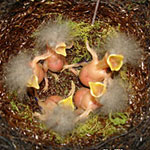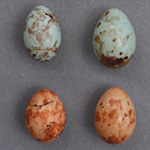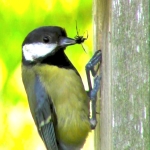Our group studies how and why behaviour, in its broadest sense, evolves in the natural world. We do this by working on a variety of study species both in the field and in the lab. We pride ourselves on our uniquely friendly and collaborative atmosphere. Our research questions fall under four general themes:
Social Evolution
 Social evolution describes the evolutionary consequences of interactions between individuals, within families, or across species. We are particularly interested in identifying conditions that result in cooperative interactions between unrelated individuals or conflict between relatives.
Social evolution describes the evolutionary consequences of interactions between individuals, within families, or across species. We are particularly interested in identifying conditions that result in cooperative interactions between unrelated individuals or conflict between relatives.
Main study species:
Burying beetles in Cambridge, hihi in New Zealand, and avian brood parasites and their hosts in Cambridge and Zambia.
Coevolution
 Coevolution is the process by which interacting parties reciprocally select traits in each other. We investigate coevolution by studying antagonistic interactions between parents and offspring, and predators and prey. In particular, our group has a long history of studying brood parasitic birds and their hosts.
Coevolution is the process by which interacting parties reciprocally select traits in each other. We investigate coevolution by studying antagonistic interactions between parents and offspring, and predators and prey. In particular, our group has a long history of studying brood parasitic birds and their hosts.
Main study species:
Cuckoos and reed warblers in Cambridgeshire; honeyguides, cuckoo finches, and their hosts in Zambia; and burying beetles in the lab in Cambridge.
Information Ecology
 Information ecology synthesises how animals acquire information, with the evolutionary and ecological outcomes of its use. We study this topic by asking how brood parasite hosts use information to adapt to local environments, how birds use and evolve taste preferences, and how social networks affect predator-prey coevolution.
Information ecology synthesises how animals acquire information, with the evolutionary and ecological outcomes of its use. We study this topic by asking how brood parasite hosts use information to adapt to local environments, how birds use and evolve taste preferences, and how social networks affect predator-prey coevolution.
Main study species:
Hihi in New Zealand, lizards in Greece, great tits in Cambridge and Finland, and avian brood parasites and their hosts in Cambridge.
Conservation Ecology
 Conservation ecology involves understanding behaviour, ecology, and evolution to conserve species and environments. We work on a wide range of conservation topics, from specific threatened species to broad-scale ecological phenomena such as sex ratio and geographical range shifts.
Conservation ecology involves understanding behaviour, ecology, and evolution to conserve species and environments. We work on a wide range of conservation topics, from specific threatened species to broad-scale ecological phenomena such as sex ratio and geographical range shifts.
Main study species or ecosystems:
Razo larks in the Cape Verdes, hihi in New Zealand, sea birds on Henderson Island and the Falklands, wintering migrants in Zambia.
